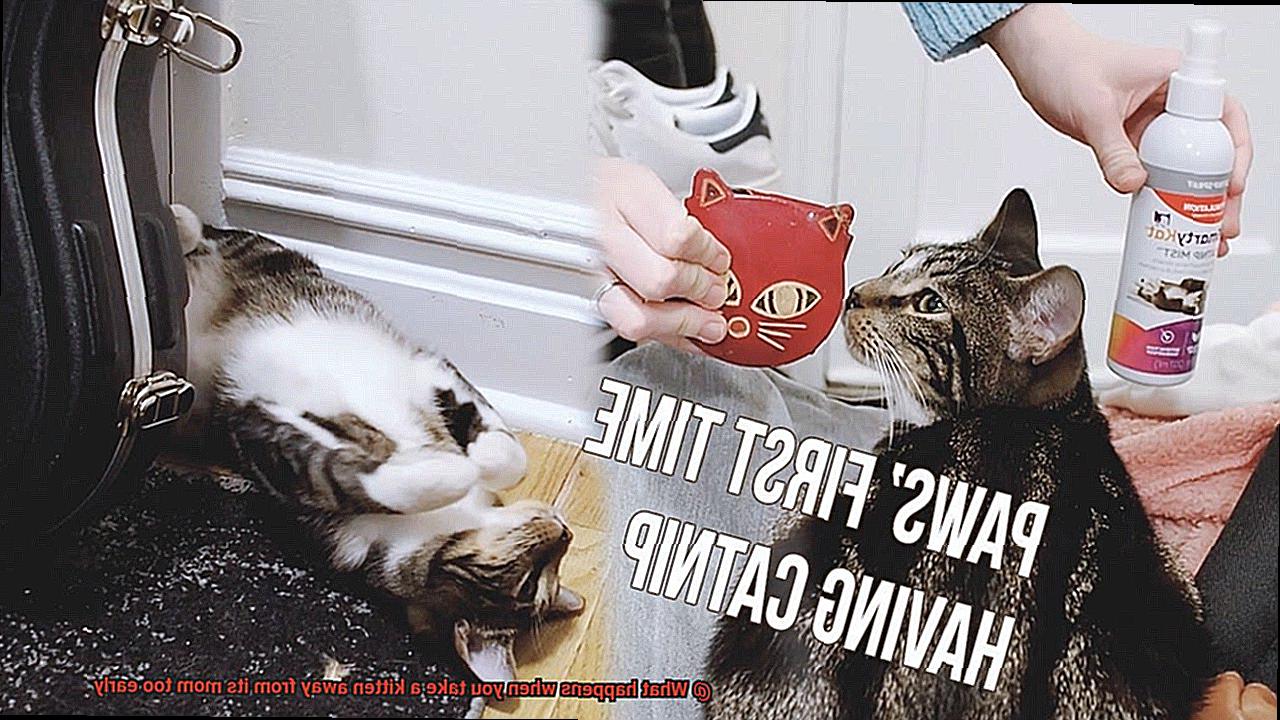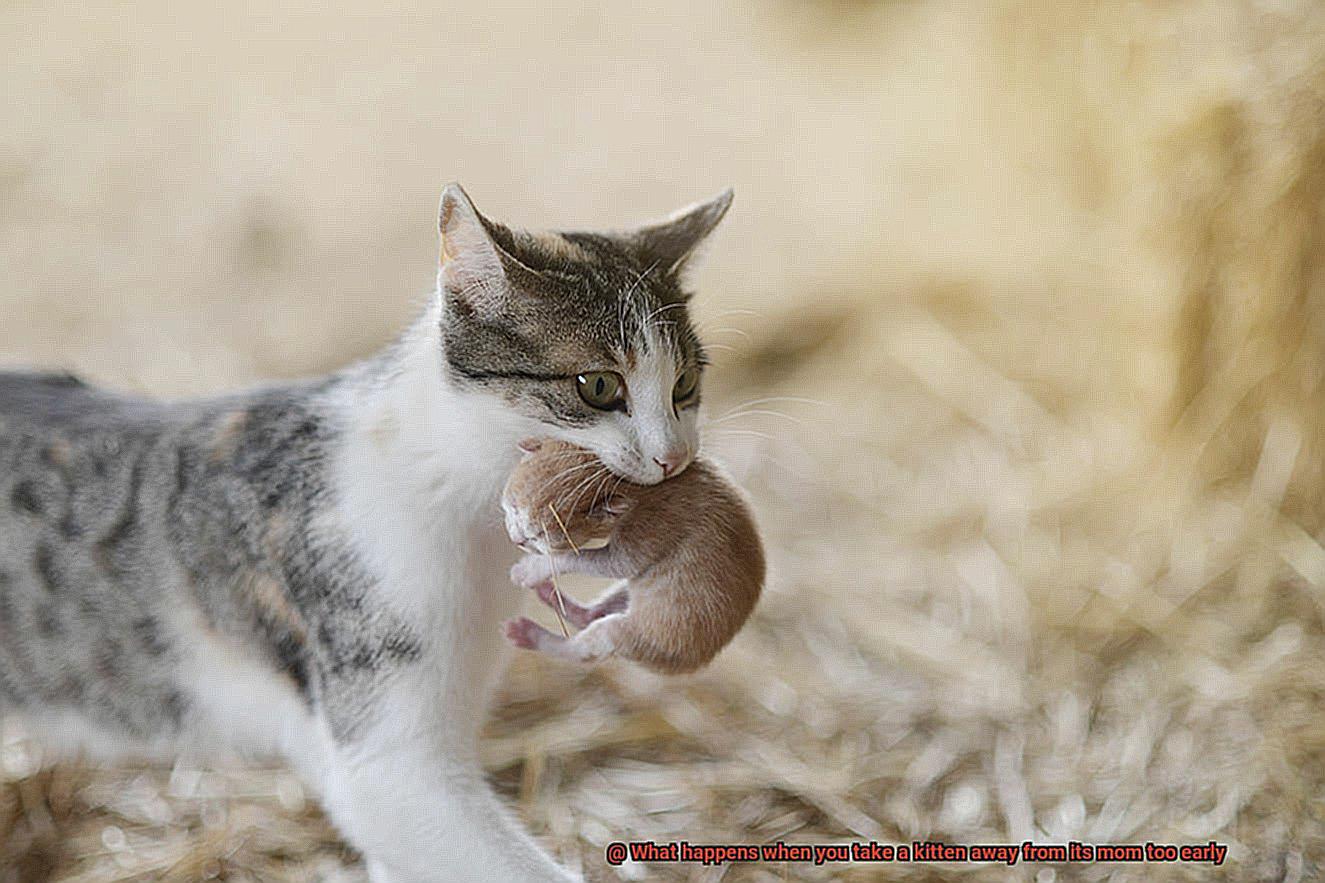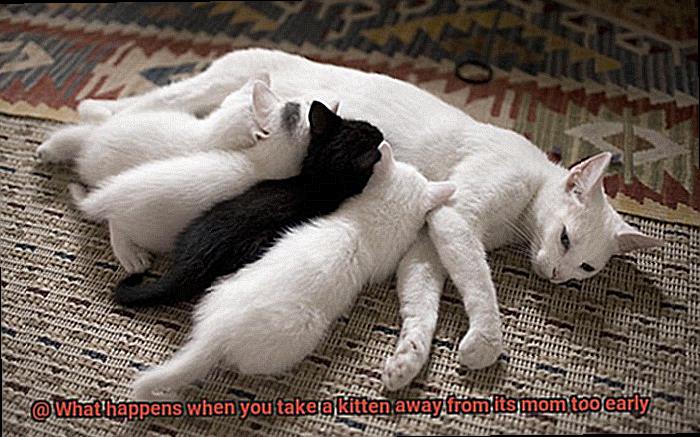Kittens are a delightful addition to any household. They’re cute and cuddly, with tiny paws and playful personalities that can melt anyone’s heart. But did you know that removing a kitten from its mother too early could have serious consequences for its health and wellbeing?
As an expert in feline care, I’ve seen firsthand the impact of separating kittens from their mothers before they reach 8-12 weeks old. Kittens need this time with their mothers to learn crucial skills like socialization, play, and even how to use the litter box. When they’re taken away too soon, they miss out on these essential lessons.
The results can be devastating. Kittens who are separated from their mothers too early may suffer from behavioral issues like anxiety and aggression. Their immune systems may also be weakened, leaving them more vulnerable to illness.
If you’re considering adopting a kitten, it’s vital to make sure they’ve had enough time with their mother before being separated. In this blog post, we’ll explore why it’s so important for kittens to stay with their mothers for at least eight weeks, the negative effects of early separation, and what steps you can take to ensure your kitten has the best possible start in life.
So if you want your new furry friend to thrive and grow into a healthy adult cat, read on to learn why taking a kitten away from its mom too early is never a good idea.
Ideal Age for Weaning and Separating Kittens from their Mothers
To ensure proper development, it is recommended to wait until the kittens are at least eight weeks old before separating them from their mothers.
During the first few weeks of life, kittens rely entirely on their mother’s milk for nutrition. Weaning is a gradual process that begins around four weeks of age, during which kittens start to eat solid food while still nursing. This process usually lasts several weeks until the kittens are fully weaned.

Premature separation can have adverse effects on kittens’ physical and emotional health. Separating them from their mothers before they are fully weaned can lead to nutritional deficiencies and weakened immune systems, making them more susceptible to illnesses. It can also negatively impact their socialization skills, as kittens learn important behaviors such as grooming, playing, and communicating from their mothers and siblings. Without proper socialization, kittens may develop behavioral problems later in life, such as aggression, anxiety or fearfulness.
It is therefore vital to allow kittens to stay with their mothers for at least eight weeks to ensure they receive adequate nutrition and proper socialization. Waiting until twelve weeks can be even better since it provides more time for the kitten’s development.
Separating kittens from their mothers too early can cause separation anxiety and stress. Kittens rely on their mother for comfort and security, and removing them too soon can cause them to feel scared and insecure. This can result in destructive behaviors such as excessive meowing, scratching, or even self-harm.
Social Skill Development Issues
One critical aspect of this is allowing them sufficient time with their mothers before separating them. When a kitten is taken away from its mother too early, it can experience several social skill development issues that can negatively impact its behavior and overall well-being.
So, what are these issues, you may ask? Let’s dive into the research notes to understand the potential consequences of separating a kitten from its mother too early on its social skill development.
Firstly, kittens learn essential socialization skills from their mothers, such as how to interact with other cats. When taken away too early, kittens may not have had the chance to learn these critical skills, leading to behavioral problems such as aggression and fearfulness towards other cats later in life. This lack of socialization can also lead to an inability to adjust to new environments and people.
Secondly, communication skills are vital for cats, and they learn them from their mothers. Kittens learn how to read and respond to different vocalizations and body language cues from their mothers. When separated too early, they may struggle to understand these communication signals, leading to confusion and frustration in social situations. This lack of understanding can lead to miscommunication or even fear of humans.
Lastly, self-soothing techniques are crucial for managing stress and anxiety in cats. Kittens learn these techniques from their mothers, but if taken away too early, they may not have had the opportunity to develop them. As a result, they may experience increased stress levels and potential behavioral issues such as excessive scratching or destructive behavior.
In summary, taking a kitten away from its mother too early can lead to several social skill development issues that can negatively impact its behavior and overall well-being. It is crucial to ensure that kittens are allowed sufficient time with their mothers before being separated to promote healthy socialization and development. This includes exposure to new experiences, environments, and human interaction.
Nutrition and Immune Support Issues
Before you do, it’s important to understand the potential consequences of separating them from their mother too early. Kittens need their mother’s milk for essential nutrients and antibodies that are crucial for their immune system development. Without access to these components, young felines can face various nutrition and immune support issues that can impact their growth and development.
One of the most significant problems that arise from early separation is malnourishment. Kittens who are deprived of their mother’s milk may not receive adequate nutrients to support their growth, leading to stunted development and potential health issues later in life. Digestive problems such as diarrhea may also occur, affecting their overall well-being.
Furthermore, early separation can weaken a kitten’s immune system, leaving them vulnerable to diseases and infections. The antibodies present in a mother’s milk help protect against such illnesses, but without them, kittens are more susceptible to sickness. This can result in frequent sickness and even life-threatening infections.

Fortunately, there are ways to address these issues and provide proper nutrition and immune support for kittens that are separated from their mothers too soon. One solution is to feed them specialized kitten formula that contains essential nutrients found in their mother’s milk. Additionally, supplements like probiotics and vitamins can help boost their immune system and prevent illness.
Remember that early separation from a kitten’s mother can have significant impacts on their nutrition and immune system. As a responsible pet owner, it’s crucial to take steps to mitigate these risks and provide the necessary support for your new furry friend. By ensuring they receive proper nutrition and immune support, you’ll give them the best possible start in life.
Separation Anxiety and Stress
Kittens who are taken away from their mothers too early may struggle with social and coping skills, leading to a range of physical and emotional symptoms that can have serious consequences for their health.
One of the most common manifestations of separation anxiety in kittens is excessive crying or meowing. This behavior may be a sign that your kitten is having difficulty adjusting to their new environment without the comforting presence of their mother. Additionally, kittens who are separated from their mothers prematurely may refuse to eat or drink, become lethargic and withdrawn, or engage in destructive behaviors like scratching and biting.
But the toll of premature separation on a kitten’s health goes beyond these behavioral symptoms. Without the antibodies present in their mother’s milk, these vulnerable creatures are at increased risk for developing respiratory infections, digestive issues, and weakened immune systems.
To minimize the risk of separation anxiety and stress in your kitten, it’s crucial to avoid separating them from their mother too early whenever possible. If separation is necessary, ensure that your kitten receives plenty of love, care, and attention to help them adjust to their new environment. Consider providing them with interactive toys, a cozy bed, and a consistent routine to make the transition as smooth as possible.
In addition to these practical measures, it’s essential to prioritize your kitten’s emotional well-being by creating a nurturing environment that encourages positive social interactions. This can include spending quality time with your kitten every day, playing games together, and rewarding good behavior with treats and affection.
Behavioral Problems in Kittens Taken Away Too Early
Kittens are not just cute little balls of fur; they are highly social creatures that require proper socialization and nurturing to develop healthy behaviors. Unfortunately, when kittens are taken away from their mothers too early, they may experience various behavioral problems that can have a lasting impact on their lives.
One of the most common problems in such kittens is separation anxiety. Separation from their mother and littermates can be overwhelming, causing these tiny creatures to experience feelings of fear, anxiety, and even depression. This can result in excessive meowing or crying, destructive behavior, and even refusal to eat.
In addition to separation anxiety, aggression is another issue that may arise in kittens taken away from their mothers too early. Without adequate socialization with their mother and littermates, these kittens may struggle with aggression towards other cats or humans. This can lead to fear and anxiety, making it harder for them to adjust to new environments.
Moreover, proper litter box training is crucial for a kitten’s well-being. However, when a kitten is taken away from its mother too early, it may not have had enough time to learn this behavior, leading to accidents and frustration for the owner.
Finally, self-mutilation behaviors such as excessive grooming or biting their nails may also occur in such kittens. These are often signs of anxiety or stress resulting from being taken away from their mothers too early.
To prevent these behavioral problems, it is crucial to wait until a kitten is at least 8 weeks old before removing them from their mother. During this time, they learn critical socialization skills and behaviors that will help them adjust to their new homes. Early socialization and proper care can help prevent many of these behavioral problems and ensure a happy and healthy life for the kitten.
Possible Solutions for Kittens Taken Away Too Early
There are possible solutions to mitigate the negative effects of this separation and ensure your kitten thrives.
One crucial solution is providing your kitten with appropriate nutrition. Kittens require essential nutrients found only in their mother’s milk, and if they were taken away too early, they may have missed out on these vital elements. As such, it is important to provide them with high-quality kitten formula and ensure they are fed regularly and in sufficient amounts to support their growth and development.
Another essential solution is socialization and stimulation. Kittens learn important social skills from their littermates and mother, so if your kitten missed out on this, providing opportunities for socialization and play is necessary. You can introduce them to other cats or humans, give them toys, and play with them regularly to encourage healthy behaviors.

Creating a safe and comfortable environment is also crucial for your kitten’s wellbeing. Kittens that were taken away from their mothers too early may feel insecure and anxious. Therefore, make sure they have a cozy bed, a litter box, and a quiet space where they can feel safe and secure.

Finally, seeking veterinary care for your kitten is vital. Kittens separated from their mothers too early are at a higher risk of developing health problems, such as respiratory infections or parasitic infestations. Thus, scheduling regular check-ups with a veterinarian is essential.
What to Expect When Rehoming a Kitten Too Young
Adopting a kitten is an exciting and rewarding experience, but it’s important to keep in mind that kittens need to stay with their mother for a certain amount of time. Taking a kitten away from its mother too early can lead to various negative consequences that can affect the kitten’s health and behavior. Here are five potential consequences of rehoming a kitten too young:
Behavioral problems
Kittens learn social skills and how to interact with other cats through their mother and littermates. When taken away too soon, they miss out on this critical learning period, which can result in poor socialization skills and difficulties interacting with other cats later in life. This can also lead to behavioral problems such as aggression or anxiety.
Nutritional deficiencies
Mother’s milk contains essential nutrients and antibodies that help the kitten grow and stay healthy. If a kitten is taken away before it has had enough time to nurse, it may not receive all of the necessary antibodies from its mother’s milk and can become susceptible to illnesses. This can lead to stunted growth, weakened immune system, and other health problems.
Stress and anxiety
Being separated from their mother and littermates can be traumatic for a young kitten and cause them to develop anxiety or depression-like symptoms. Without the comfort of their mother, they may become anxious or depressed, which can result in destructive behaviors such as excessive meowing, scratching, or even self-harm.
Stunted growth
Kittens that are removed from their mother too early may not receive all of the necessary nutrients they need for proper growth and development. This can result in stunted growth, which can lead to health problems later in life.
Difficulty adjusting
Moving to a new home can be stressful for kittens. Without the comfort of their mother and littermates, they may have trouble adjusting to their new environment. This can cause them to become anxious or depressed, which can lead to destructive behaviors.
How to Avoid Taking a Kitten Away Too Soon
Kittens are adorable and cuddly creatures that can easily melt anyone’s heart. However, taking them away from their mother too soon can have severe consequences on their physical and emotional development. Here are some ways to avoid taking a kitten away from its mother too soon.
Wait Until They Are At Least 8 Weeks Old
Experts recommend that kittens stay with their mother until they are at least 8 weeks old, and preferably 10-12 weeks old. During this time, they learn crucial socialization skills from their mother and littermates, such as how to communicate, play, and groom themselves. Kittens that are taken away too soon may not have learned these important lessons and can develop behavioral issues later in life, such as anxiety, aggression, and difficulty with litter box training.
Work With a Reputable Breeder or Shelter
When adopting a kitten, it’s important to work with a reputable breeder or shelter that follows appropriate guidelines for kitten care. A good breeder will allow the kitten to stay with its mother and littermates until they are at least 8 weeks old, provide appropriate vaccinations and medical care, and ensure that the kitten is healthy before it goes to its new home. A reputable shelter will also have evaluated the kitten’s health and behavior before allowing it to be adopted.
Ensure They Have Proper Nutrition
Kittens need proper nutrition to develop properly. Before separating them from their mother, make sure that they are eating solid food and have been appropriately weaned. This ensures that they will continue to grow and thrive in their new environment.
Provide Plenty of Socialization and Environmental Enrichment
If your kitten has been separated from its mother too soon due to health or safety concerns, it’s important to provide them with plenty of socialization and environmental enrichment. This can include providing toys, scratching posts, climbing structures, and spending time playing with them regularly. This will help them develop important socialization skills and behaviors that they may have missed out on by being separated too soon.
Ask About Their Background
When adopting a kitten, ask about their history and ensure that they have been properly socialized with other cats and people. This will help you understand their personality and behavior better and ensure that they are well-adjusted and able to thrive in their new environment.
rd0OqVqIfLo” >
Conclusion
In conclusion, removing a kitten from its mother too early can have severe consequences on its physical and emotional health. As a feline care expert, I have witnessed the detrimental effects of separating kittens from their mothers before they are eight to twelve weeks old. During this critical period, kittens acquire important skills such as socialization, playtime, and litter box training that are essential for their overall wellbeing.
Unfortunately, early separation from the mother can lead to devastating outcomes. Kittens may develop behavioral issues such as anxiety and aggression due to the lack of proper socialization. Additionally, their immune systems may be compromised, making them more susceptible to illnesses.
To ensure optimal development and prevent these negative impacts, it is highly recommended to wait until the kittens reach at least eight weeks old before separating them from their mothers. This timeframe allows them to learn crucial socialization skills and behaviors that will enable them to adjust better in their new homes. Early socialization and proper care can also help prevent many behavioral problems and ensure a happy and healthy life for the kitten.
If you are considering adopting a kitten, it is essential to ensure that they have spent enough time with their mother before being separated. Providing them with appropriate nutrition, environmental enrichment, socialization opportunities, and necessary veterinary care will give them the best possible start in life.







